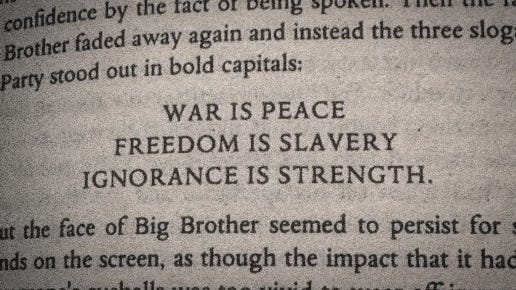1984 is a soap opera
gilmore girls reads 1984: decoding the words and world of orwell
where is it referenced in gilmore girls?
In The Festival of Living Art (4x07) Lorelai asks Sookie if she wants to see something “from 1984” to which Sookie responds, “The book?”.
annotations in the margins
“It was a bright cold day in April and the clocks were striking thirteen.”
It’s the opening line of a cult classic and one of the most renowned dystopian novels of all time. It serves as immediate forewarning about what you’re going to read: what comes next is a bizarre story in which nobody really has a grasp on time, reality or truth anymore.
Throughout, Orwell focuses on the commonality of censorship and surveillance, and his fears for the fate of humanity. It heavily reflects societal issues and contexts, discussing the destruction of language and literature, the nature of political propaganda, and authoritarian control.
It’s written in Orwell’s journalistic tone, setting out the facts clearly for the reader, and yet at the same time, it’s a hazy tale infused with prose and descriptive language that adds to the sense that reality is distorted.
It follows a tripartite structure in order to present a startlingly sinister world. The first part largely focuses on worldbuilding, while the second centres around romance and rebellion, and the final part on the violent, sado-masochism of authoritarian leaders.
In terms of genre, 1984 is a frankly surreal depiction that combines elements of dystopia and soap opera. It has it all: love, rebellion and betrayal, characterised by violence and uncertainty.
Truly soap worthy.
That is, of course, if a soap opera were set in a bleak version of Britain that constantly smells like cabbage.
cultural crash course
1984 is a cultural phenomenon, with Orwell creating terms that are now used in common conversation. To name a few:
Big Brother - in 1984, the omniscient and omnipotent totalitarian leader, but in modern pop culture (paradoxically) a reality TV show characterised by surveillance.
Room 101 - in 1984, a place of torture in which people are exposed to their worst fears to allow for complete submission, but in modern pop culture, yet another TV show (mirroring the book in ways, with celebrities banishing their worst fears to the room).
Newspeak - language used in political propaganda, characterised by euphemisms and ambiguity.
It defined culture and language, and continues to do so.
tab-worthy lines
“War is peace. Freedom is slavery. Ignorance is strength.”
“Thoughtcrime does not entail death. Thoughtcrime is death.”
“You have to live - did live, from habit that became instinct - in the assumption that every sound you made was overheard, and, except in darkness, every movement scrutinized.”
“Cut off from contact with the outer world, and with the past, the citizen of Oceania is like a man in interstellar space, who has no way of knowing which direction is up and which is down.”
“I hate purity. I hate goodness! I don’t want any virtue to exist anywhere. I want everyone to be corrupt to the bones.”
stars hollow scores
★ ★ ★ ★ ★ - 5 stars
1984 deserves a five-star rating, and not just for its impact on culture or its writing style…
Orwell set out to make political writing an art form. 1984 is the pinnacle of political writing, banned in countries around the world for numerous reasons - it being pro-communist, anti-communist or too sexual being common reasons. Despite being published in 1948, the political content of 1984 is eerily prevalent today, which is largely what makes it such a great read: we can see the necessity of its message in the world around us even now.



